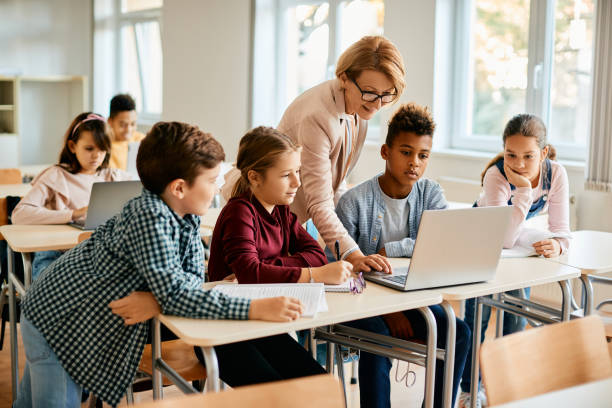Affordable Primary Science Tuition Singapore for All Learning Needs
Affordable Primary Science Tuition Singapore for All Learning Needs
Blog Article
Discovering the Different Training Strategies in Primary Scientific Research Education And Learning Today
Inquiry-based learning, hands-on experiments, and the combination of innovation are redefining exactly how instructors involve young minds. In addition, collective strategies and set apart direction are being used to cater to the diverse demands of students, boosting both involvement and understanding.
Inquiry-Based Learning
Inquiry-Based Understanding (IBL) is an instructional technique that motivates trainees to explore clinical ideas through doubting, examination, and hands-on testing. This technique stresses the function of pupils as energetic participants in their learning, advertising crucial reasoning and analytic skills. By engaging with real-world questions, students end up being determined and curious, which enhances their understanding of scientific concepts.
In IBL, teachers act as facilitators, leading pupils as they browse their inquiries as opposed to delivering information straight. This student-centered method enables distinction, accommodating various learning styles and rates. Students develop skills in developing hypotheses, creating experiments, and analyzing data, which are crucial for scientific proficiency.
In addition, IBL cultivates cooperation amongst pupils, encouraging them to share concepts and findings. This cumulative questions advertises social skills and a sense of community within the class. Additionally, the process of inquiry encourages strength, as students find out to embrace failure as a tipping stone toward understanding.
Hands-On Experiments
Hands-on experiments are a vital part of efficient scientific research education and learning, enhancing the principles of inquiry-based discovering. These experiments allow pupils to engage directly with scientific concepts, promoting a much deeper understanding through experiential learning. By adjusting materials and observing results, young students can realize abstract concepts in tangible methods.
Such tasks advertise crucial reasoning and analytic skills, as pupils assume outcomes, conduct experiments, and examine outcomes. This procedure encourages them to ask inquiries, fine-tune their understanding, and create a scientific attitude. Hands-on experiments can be tailored to varied understanding designs, making sure that all students have the chance to engage meaningfully with the web content.
Moreover, hands-on experiments usually encourage partnership amongst peers, advertising team effort and interaction skills. Operating in teams allows students to share ideas, review searchings for, and pick up from each other, which improves their total academic experience.
Integrating hands-on experiments right into the key scientific research educational program not only enhances the finding out environment yet additionally cultivates a lifelong interest in scientific research. By actively taking part in their education and learning, students are most likely to develop an enthusiasm for clinical query that expands beyond the classroom.

Modern Technology Combination
Integrating innovation right into main scientific research education and learning has actually become significantly crucial in cultivating pupil involvement and improving finding out results. Making use of electronic tools, such as interactive simulations, virtual laboratories, and instructional software, provides pupils with chances to explore scientific principles in innovative means. These resources help with a much deeper understanding of complicated topics by enabling students to imagine and manipulate variables that would certainly be impractical in a typical class setup.
Additionally, technology integration urges customized finding out experiences. Trainees can progress at their very own pace, revisiting challenging concepts through multimedia sources, which deal with different knowing designs. This adaptability not just sustains specific growth however also cultivates a sense of autonomy in learners.
Additionally, modern technology works as a bridge to real-world science, connecting trainees with existing research study and specialist contributions. Access to on the internet data sources and scientific journals widens pupils' viewpoints on clinical questions and promotes crucial assuming abilities.
Collaborative Knowing
Collective learning plays an essential duty in main scientific research education by fostering teamwork and interaction skills amongst pupils. This technique encourages learners to collaborate, share understanding, and take part in analytical, which enhances their understanding of clinical principles. By taking part in team tasks, students find out to verbalize their concepts, listen to varied viewpoints, and work out services, all of which are crucial skills in both scholastic and real-world contexts.

Research suggests that collective learning can result in boosted motivation and engagement in scientific research topics, as trainees discover enjoyment in common experiences (primary science tuition Singapore). In addition, this technique prepares pupils for future joint endeavors, equipping them with the skills needed for effective teamwork in greater education and learning and specialist atmospheres. Eventually, welcoming collaborative learning in key science education and learning can substantially enhance the understanding experience and advertise a deeper understanding of scientific questions
Distinguished Instruction

Separated instruction can materialize in different means, such as varying the material, procedures, or items of discovering. As an example, instructors might use tiered tasks read the full info here that supply varying degrees of complexity, permitting pupils to work at their corresponding preparedness degrees. In addition, adaptable organizing methods can assist in cooperation amongst students with various abilities, fostering peer understanding.
Assessment plays a critical function in this technique, as it notifies guideline and assists teachers comprehend each trainee's unique needs. Developmental assessments, such as monitorings and quizzes, can assist instructors in readjusting their methods to enhance finding out end results. primary science tuition Singapore. Ultimately, by implementing set apart redirected here guideline in main scientific research education, teachers can cultivate an extra reliable and equitable understanding environment, encouraging all pupils to reach their complete potential in comprehending clinical sensations
Conclusion
In summary, the diverse teaching strategies in key scientific research education and learning, consisting of inquiry-based learning, hands-on experiments, modern technology integration, joint discovering, and differentiated guideline, collectively contribute to an extra reliable discovering atmosphere. These methods advertise crucial reasoning, problem-solving abilities, and a much deeper understanding of scientific concepts. By executing these methods, instructors can produce supportive and interesting classrooms that deal with the different demands of pupils, eventually fostering a long-lasting passion in scientific research and boosting scholastic accomplishment.
Inquiry-Based Knowing (IBL) is an instructional approach that motivates trainees to discover scientific principles with doubting, examination, and hands-on testing.Collaborative discovering plays an important duty in primary science education by cultivating teamwork and interaction skills among students.Study suggests that collaborative learning can lead to enhanced inspiration and engagement in science subjects, as trainees discover enjoyment in shared experiences.In cultivating an inclusive discovering atmosphere, distinguished direction emerges as a key method to suit the varied needs and abilities of pupils in key science education. Inevitably, by implementing differentiated direction in click to investigate main science education, educators can grow an extra fair and efficient understanding environment, empowering all trainees to reach their complete potential in recognizing scientific sensations.
Report this page